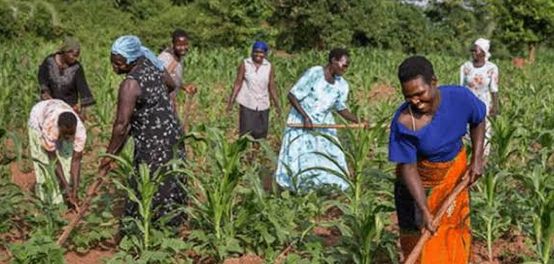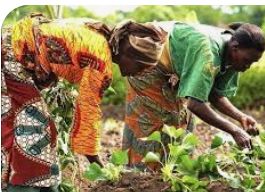
Edo State has a rich tradition of women’s involvement in agriculture, even more than men. In fact, I still recall when I was in school back home and used to go to farm around Sabongida Ora. Almost all the farmworks were undertaken by women in the communities. Women used to engage extra hands, like me, for a fee, in tilling the ground and even in harvesting.
While the women were busy on the farms, the men, their husbands, would be around the compounds or the houses playing eyo game or ludo or other past time games, gulping bottles of local wine.
So, undoubtedly, women in Edo state, time immemorial, have been playing critical roles in the production, processing and marketing of agricultural goods, especially in rural areas.
They indeed, have long been active participants in various aspects of agriculture, including real farming.
They are primarily involved in crop cultivation such as cassava, yam, maize, plantain, okra, pepper, tomatoes, oil palm, rice (in riverine areas), vegetables (e.g. fluted pumpkin, amaranth) and several others.
Women dominate food processing activities like cassava into garri/fufu, oil palm processing and local spice preparation. This is in addition to acting as traders of agricultural produce in local markets, a role passed down through generations.
Women in peri-urban and rural communities, also engage in backyard poultry and vegetable farming.
Women’s activities ensure household and community-level food availability. Income from farming and market sales supports children’s education and family health.
 Meanwhile, Women’s cooperatives have risen over time to support microfinance schemes, local savings and communal projects. This is in addition to some Organizations which have noticed the activities of those hardworking women and and have formed support networks. They include Edo Women Farmers Cooperative Societies, which is a local groups that empowers women through shared resources and knowledge.
Meanwhile, Women’s cooperatives have risen over time to support microfinance schemes, local savings and communal projects. This is in addition to some Organizations which have noticed the activities of those hardworking women and and have formed support networks. They include Edo Women Farmers Cooperative Societies, which is a local groups that empowers women through shared resources and knowledge.
There are also None Governmental Organizations (NGO) like Lift Above Poverty Organization (LAPO) that provide micro-credit to rural women in agriculture.
The State’s ministry of Agriculture has also been of support to the women through training, farm inputs and women-focused schemes.
There is also Women in Agriculture (WIA) programs under ADP (Agricultural Development Programme): it offers extension services tailored to female farmers.
However limited access to land in which cultural practices restrict women’s land ownership has turned out to be a big challenge.
Another challenge is the low access to credit and Inputs in the struggle to access fertilizer, improved seeds and loans.
Poor access to technology has equally restricted the women traditional tools, thereby reducing productivity.
Those women are facing difficulty accessing formal markets or fair prices, besides the effects of climate change that have arisen from flooding.
All such factors have combined to negatively affect crop yield, especially in riverine areas.
Rising to address the negative elements in the agricultural practices, the state has long introduced some empowerment programs, including FADAMA, IFAD-VCDP, with women-inclusive components.
NGOs and government extension services have also introduced agricultural training and skill acquisition. They also introduced
Youth and Women in Agribusiness Initiatives to attract younger women to farming, using modern technology.
There are as well individuals that have risen to encourage women to be more productive in the trade. Such individuals including
Princess (Dr.) Florence Edebiri, Known for advocating rural women’s inclusion in Edo agricultural development.
There are also local agribusiness leaders and female cooperative presidents that used to lead training and mobilization in Local Government Areas.





